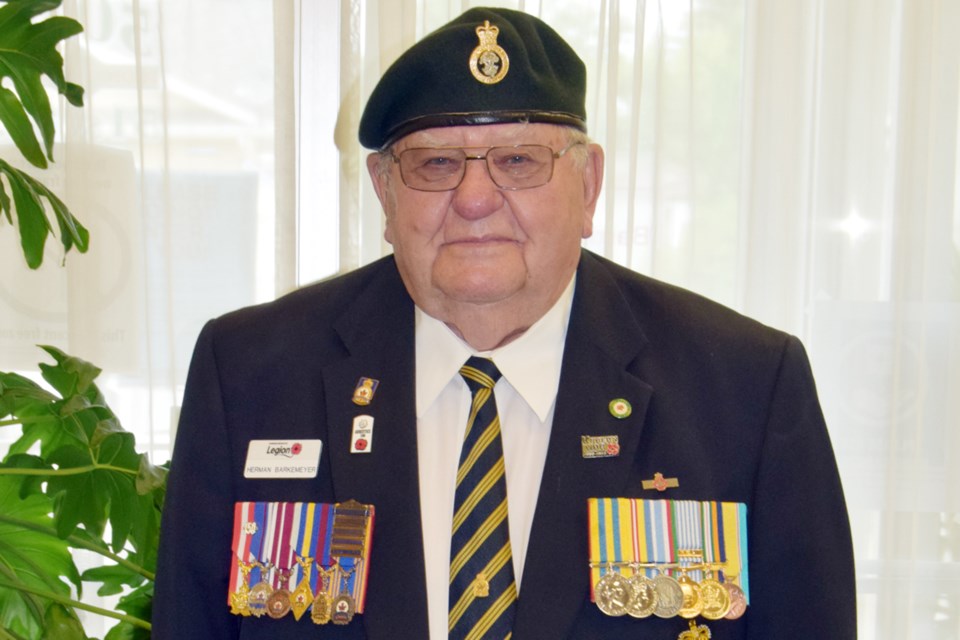BARRHEAD - Herman Barkemeyer hasn't had a good night's sleep for over 70 years.
That is because the 92-year-old suffers from post-traumatic stress disorder (PTSD).
PTSD is a mental disorder that develops from experiencing a traumatic event.
Barkemeyer's PTSD stems from the traumatic events he witnessed and experienced as part of the Canadian Armed Forces (CAF) contingent during the Korean War.
"Back then, they called it shell shock," he said.
From 1950 to 1953, Canada joined 21 other nations as part of a United Nations (UN) force to help South Korea combat North Korean forces who invaded their country on June 25.
Barkemeyer served an 18-month tour in-country during the height of the hostilities.
July 27 marked the 72nd anniversary of the armistice.
Barkemeyer served for five years in the Princess Patricia's Canadian Light Infantry (PPCLI), first joining the "Pats" at the age of 17, lying about his age.
He was one of nearly 27,000 Canadians who served in Korea, of whom 513 were killed, 32 were captured, and another 1,200 were wounded.
Following his enlistment, Barkemeyer was sent to Calgary for six weeks of basic training before a newly formed Canadian battalion was deployed to Japan, specifically to Yokohama, which served as a staging area before heading to the front lines.
"It took nine days to get there in an old rickety boat," he said.
Initially, the war was called a "conflict", but Barkemeyer said anyone connected who served "in-country" knew differently.
"It was a war."
Barkemeyer said he was one of about a handful of Barrhead-area residents who served in Korea during the war itself and in the subsequent years, from 1953 to 1957, when 7,000 CAF personnel served as part of the United Nations occupational peacekeeping force.
"I can't remember exactly how many were from Barrhead. My memory is not as good as it once was, but it sure is at three in the morning," he said, adding that is when the memories of his time in Korea most often surface. "And it is not the good stuff."
Barkemeyer recalled prior to his time in Korea, he was a good sleeper.
"Now I'm up every night," he said.
He added that he did not want to talk too much about his war experience, saying that it does not take much to trigger the memories.
"Imagine, you are on patrol, on the run, so you lie down, and you lie in human waste because that is what the farmers used to fertilize their fields," Barkemeyer said.
He also recalled how about being wet almost constantly, the misery of living in trenches, how soldiers would wear balaclavas when they slept to protect themselves from the rats.
One of the things that helped Barkemeyer deal with the symptoms of his PTSD, besides his wife Inga (the pair are approaching their 70th anniversary), was when the Korea Veterans Association of Canada, with the assistance of the Korean government, arranged in 1990 an expense-free 10-day tour of the country for the veterans.
"To see the impact of our efforts, the Korean people have made in the rebuilding of their country. It is a beautiful place. It was a great help," he said, adding that the people of South Korea are very appreciative of veterans' efforts and sacrifice.
As is the Canadian Korean community, Barkemeyer said.
"They are so damn good to us," he said.
Barkemeyer said that is contrary to the reception the veterans received when they first returned home.
"It was the forgotten war. Unlike the end of the Second World War, there was no welcoming committee for the Korean veterans. We just came home," he said.
Barkemeyer noted that the chilly reception Korean veterans received extended to the Legion, as it took seven years until the organization welcomed the returning soldiers as war veterans. As a result, the Korean War veterans formed their own association, but over time, many would go on to join the Legion as they become more accepted.
"A lot of the Second World War veterans did not want us because they did not consider Korea a war. They said it was a 'conflict or police action'," he said. "It wasn't until the president of the United States said, 'conflict hell, it was a war."
However, Barkemeyer said, despite a lack of respect from some Canadian Second World War veterans, he credited them for showing him and many other recruits how to be professional soldiers.
"They saved a lot of lives," he said, specifically referring to his NCO Sgt. Sid Carignan. "He really looked after us kids."
Despite the emotional impact and toll the Korean War has had on his life, Barkemeyer said, knowing what he does now, he would still have enlisted.
"War is horrible and I wish it hadn't happened, but it was part of my life and one that I am proud of."
Barry Kerton, TownandCountryToday.com



